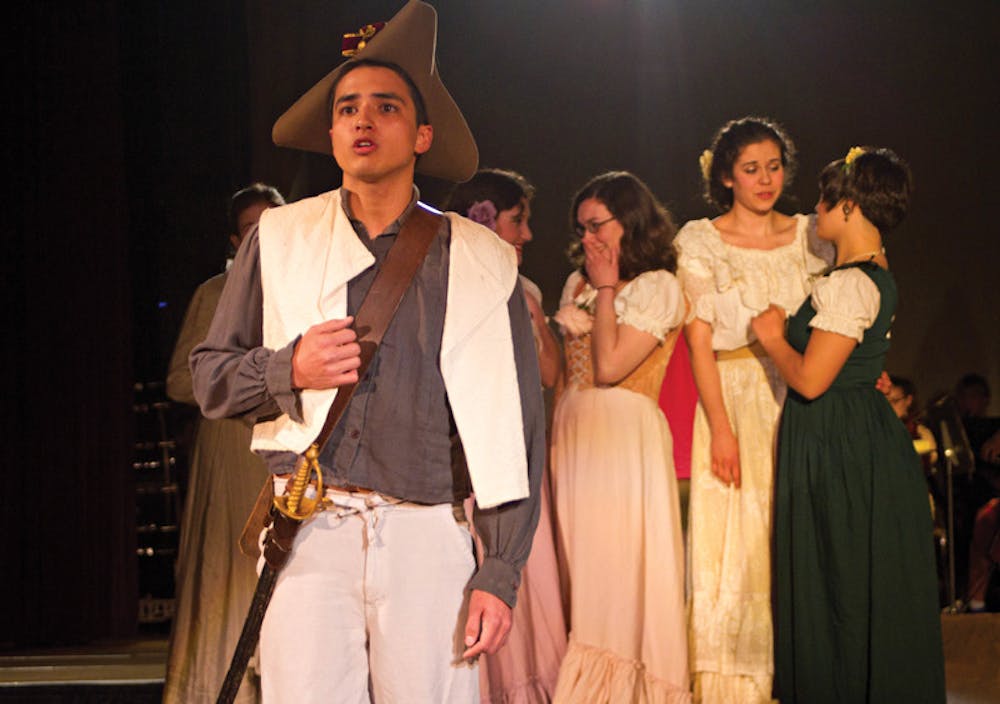Look out, mateys — swash-chucklin’ lines on the plunders of men-o’-war are coming about.
Whether you keel over luffing or just beam your aft off, you shanty be star-bored with the mast-sea cast of “The Pirates of Penzance,” Brown University Gilbert and Sullivan’s current production directed by Robert Volgman ’14. The production is accompanied by a live pit orchestra, led by musical directors Zach Wilson ’12 and Adam Kacew ’14.
“The Pirates of Penzance” is a comic opera originally written by librettist W. S. Gilbert and composer Arthur Sullivan. The storyline follows the misadventures of Frederic, who believes his indentured servitude on a pirate ship expired with his recent twenty-first birthday. He wants to marry Mabel, the beautiful daughter of Major-General Stanley, but his plan is hindered when he learns of a loophole in his contract. Because Frederic was born Feb. 29, he technically has a birthday just once every four years, meaning he has 63 more years of servitude before he is free. Torn between his sense of duty and his devotion to Mabel, Frederic finds himself caught in a bind.
Volgman — who first saw the opera as a five year old — said “The Pirates of Penzance” is his favorite production by Gilbert and Sullivan. “I thought it was hilarious. I loved the over-the-top characters and the way it didn’t feel like any other opera I’d seen before and after that one,” he said. The same could be said for Volgman’s production. The dialogue is self-consciously witty, and the presentation of humor is tight and whimsical.
In addition to the “great music,” he said, the play successfully conveys political and cultural satire, consistently poking fun at the stuffiness of the traditional Victorian opera as well as at social practices of the time. Despite its antiquated setting, the play remains popular because its humor and heart are not bound by a specific era, Volgman added.
“Many of the ridiculous aspects of culture we see in (“The Pirates of Penzance”) are still relevant today,” he said, citing Mabel’s “diva” personality and the major-general’s pomposity as examples. “But it’s still real, even beyond the jokes. There’s real emotion in Mabel’s pain when Frederic leaves to follow his duty, even if it starts out seeming absurd, and the story is ground in this realness.”
Buck Greenwald ’15 plays Major-General Stanley, characterized by an over-exaggerated superiority complex. Greenwald’s stage presence and sense of comic timing make him well-suited for the chest-puffing conceit of the role.
“(Major-General Stanley) tries really hard to appear fierce and important, and he goes way over the top to prove this image to people,” Greenwald said. This tendency is exemplified in “The Major-General’s Song,” in which he unleashes a rapid-fire and tongue-twisting stream of obscure academic references.
“To be honest, I don’t know what most of it means,” Greenwald said of the song. “I just try to think of Gimli from ‘Lord of the Rings.’ He’s my inspiration for this character.”
Emma Steele ’15.5 plays the female lead, Mabel. Steele immerses herself in the role remarkably, her performance punctuated by forward body language and saucy grins, making for convincing chemistry between the onstage lovers.
“My vision of Mabel is someone who is young and has very little experience — but she wants to be experienced,” Steele said. “That’s why she gets so excited and just grabs at life.” Steele is successful at this, infusing Mabel with archetypal naivety.
The rare and stunning quality of Steele’s angelic soprano stands out even from the collectively talented cast. She not only exercises a comfortable mastery of technical skill, but she can also charge her voice with emotional depth ranging from playfulness to despair over the course of the show. While Steele said she has received formal voice training, the natural clarity and consistency of her vibrato suggests a generous dose of raw talent.
In addition to directing, Volgman plays the lead character of Frederic. Though he said this duality of perspectives allows him to “perform both roles better,” there are moments when he does not seem fully invested in the acting.
Kacew said conducting for an opera is a “totally different ball game” compared to leading an orchestra on its own.
“The point is no longer to be in charge of everything,” he said, “but to link up the orchestra with the singers and make sure that a whole range of colors, both instrumental and vocal, end up matching at the end of the day.”
While singers modulated tempo well among themselves, there could be tighter cohesion between the actors and the orchestra, as the timing was slightly off on several occasions. This was usually resolved within several measures and generally did not detract from the quality of the performance.
The colorful orchestra, excellent casting and palpable energy between the actors made “The Pirates of Penzance” a spritely and highly enjoyable production. The opera will run Friday at 8 p.m., Saturday at 2 p.m. and 8 p.m. and Sunday at 11 a.m. in Alumnae Hall.

ADVERTISEMENT




